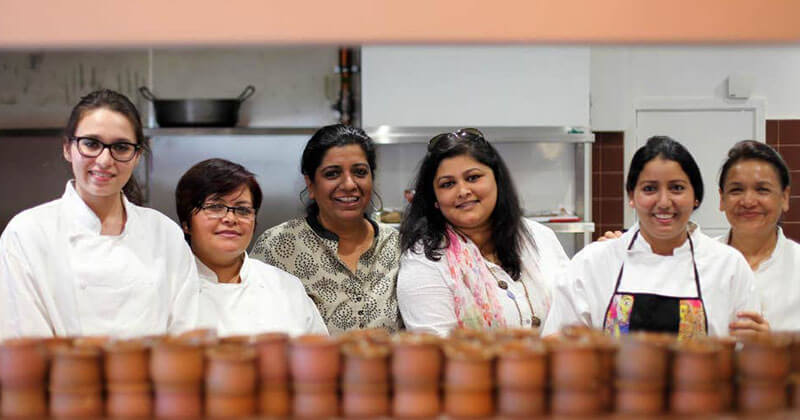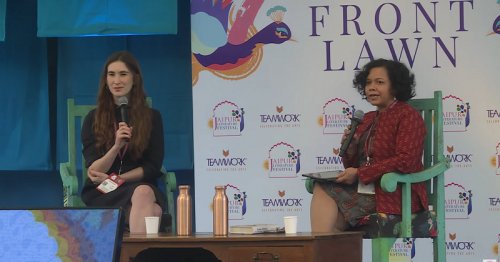Women in Professional Kitchens
In the summer of 2010, my parents began their search for a house for the family to move into. One of the properties we were visiting was an apartment in a semi-luxury, multi-storied building in Gurugram. A sharply-dressed, eloquent woman met us at the flat and proceeded to show us around; or rather show my father around- for she solely addressed my father throughout the conversation, as though purchasing the property was his decision to take. The only time she chose to interact with my mother was when we reached the kitchen area. She switched to Hindi and explained how the kitchen would meet all of her needs. The expression of disappointment on my mother's face said what we could not say openly- why was the kitchen assumed to be her preserve, while the rest of the house was not?
This is a small incident representative of a larger norm around the globe. Indian society is known to encourage or even push its women into the kitchen. Young girls are taught how to cook as they are expected to feed their families when they grow up. Women are the ones seen cooking in advertisements, movies, and TV shows, trying to meet their family’s varying wishes while also keeping everyone healthy. For a society which firmly tries to put its women in the kitchen - how is it that professional kitchens are largely occupied by men?
In the world of professional cooking, women are scarce. Few women go on to become chefs, fewer open their own restaurants, and fewer still gain widespread popularity. Restaurateur AD Singh estimates that around 80-90% of the professional chefs in India are men. The lack of women in this field isn't solely an Indian problem - it has been widely noticed in the Western world too. For instance, a Guardian report noted that only 18.5% of the professional chefs in the UK are women.
In an industry like this, Indian-born British chef and Jaipur Literature Festival 2020 speaker Asma Khan has done what many would deem impossible at first blush. She has an all-women kitchen at her London restaurant Darjeeling Express, and all the women working with her are of South Asian origin. But what makes this so hard to achieve?
Hell’s Kitchens
Professional kitchens have for long had a reputation for being ‘hell’. Cooking in a professional kitchen involves heavy physical labour, sweltering heat and intense activity - hardly a place for women to work, in the traditional understanding. Anahita Dhondy, chef-partner at the Parsi chain SodaBottleOpenerWala describes how she often faced resistance from male-dominated kitchens as a young chef. Starting at the age of 23, she has strived to revive traditional Parsi recipes by bringing her mother and grandmother’s recipes into commercial kitchens. “Parsi food has received popularity and acceptance, and obviously, it is wonderful to see such approval,” says Dhondy.
Dhondy is now known as a ‘celebrity chef’, but she was also once subjected to snarky comments like “go home early” or “don’t lift heavy things”. It was after a long struggle that she gained respect and credibility in the kitchen. She never took this to heart- but she says that this environment is the reason many women choose to not work in professional kitchens but instead work as pastry chefs or bakers. However, kitchens are now friendlier, she insists, and change is on the anvil.
Discomfort at women working in these kitchens seems odd because women have cooked for large joint families in large quantities for years. Even in modern houses, kitchens are often hot, crampy and not to forget, occasionally dangerous spaces. Both environments demand physical strength and endurance. To quote Sridevi’s character Shashi from the movie ‘English Vinglish’, “When a man cooks, it is an art. But when a woman cooks it is her duty.” It seems that there is little respite from physical labour when it comes to one of the most fundamental duties assigned historically to women - of feeding the house.
Leading the way
Finance, military, aviation, food and beverage - these are all diverse sectors, but with a similarity. These fields have all been seen as hostile to women and have so far witnessed skewed gender ratios. In all of these, it has been widely understood that the strongest factor that encourages women to enter is the presence of female role models and mentors. Mentorship becomes very important when mobility depends on social capital, which can be asymmetrical along gender lines.
American ‘Soul Food’ chef Tanya Holland echoes this sentiment. What is Soul Food, one asks? Soul Food is the name given to dishes originating from African-American cuisine in the United States. ‘Soul’ is often used as a blanket word for African-American culture. Holland’s establishment Brown Sugar Kitchen in California has been a hit, having served personalities like Drake and Steph Curry. When asked what prompted her to shift to the Bay Area from her original location in New York, Holland attributed it to the networks of exceptional female chefs in California that she has had access to. “I do join my professional women’s organisations. I’m so lucky to have these colleagues out here that are accomplished but also striving to do more things and we all share our information”, Holland once said.
Holland counts Traci Des Jardins in her favourite female chefs from the area. Traci is one of the very few female chefs who have a diversified portfolio of restaurants that they own and operate. The odds were against her, she says, but she nevertheless went on to have a very successful career. Her most famous, fine-dining restaurant Jardinière enthralled its patrons for two decades before closing - no mean feat in this business. She explained the phenomenon of missing female star chefs by saying, “I think the answer here is connections; men have had greater access to connections – and funding. I wouldn’t necessarily call it intentional discrimination, but there are just greater opportunities if you’re within the so-called ‘boys’ club.”
How does one excel without this boys' club? By talking! Jardins goes on to say, “I think we [women] are much more apt to share information. I always make a point to reach out to young women that I see are coming up in the ranks. I go over and say, “If you ever need anything, let me know" and share information. Because that has worked so well for me.”
It indeed does work. The Culinary Institute of America (CIA) is the leading culinary school in the US, located in Hyde Park. In 2018, it closed the gender gap in its admissions for the first time. Dr. Jackie Nealon, CIA’s Vice President suggested that the rising number of female role models in the industry paves the way for younger women aspiring to be chefs, and thus encourages them to enrol in culinary school. Representation and mentorship continue to matter.
Having your cake and eating it too
Jardins and Holland chose to develop their own business instead of working for an establishment, like many other female chefs. Unfortunately, this is not always a free choice. Holland has spoken about how her decision to be independent stemmed from the inability to find opportunities in existing restaurants due to her race and gender. While women don't have it easy working for others, starting up can be equally hard.
Indians have always been extremely fond of sweets. However, it took a long time for the country to adopt the famous French dessert - macarons. Once Pooja Dhingra introduced macarons to Mumbai through her bakery chain Le15, it took little time for the city to become a fan of the pastel-tinted, biscuit-like little sweet. Le15 now delivers macarons in chic pink boxes in all major cities. Dhingra started the brand at the young age of 23. All along the way, questions were posed on her ability to run the business. So much so that a particular food inspector was so surprised to see a 23-year-old girl owning a restaurant that he asked her if she’s a widow who has to run a business to make a living. Dhingra laughs about this incident and adds that while she is still often not taken seriously, things have changed for the better.
Opening one’s own restaurant gives the chef an incredible amount of freedom - in terms of expanding their craft, creative control and ensuring that the culture in the restaurant is inclusive. For women, however, it is also a way of managing family needs with work needs. Business women often work flexible hours in order to take out time for their families and in turn allow their female employees to do the same. Where families are yet to accept equality in sharing housework between genders, their own businesses allow women to fulfil both roles according to their convenience. Rashmi Daga of Freshmenu recounts being able to bring her three-year-old daughter in the kitchen, in the early years of her start-up. “She used to be with me in the kitchen and in the car while delivering orders,'” Daga says.
For working mothers anywhere in the professional world, one of the biggest concerns has been balancing childcare with work. Women owning their own businesses often find opportunities to strike this balance on their own terms.
Everywhere in the culinary world, women are extending support to other women struggling to rise up the ranks. Asma Khan’s extraordinary business, Darjeeling Express, has given space to many women to launch their own careers while bringing Indian food to the fore. Listen to her as she joins three brilliant women who have also excelled in equally challenging environments (think the US Marines) at the ‘Women and Work’ session at Jaipur Literature Festival 2020.









